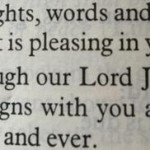Someone wrote worriedly, asking me if I am not writing because I am zonked out on painkillers. No, the back is better, the pills are packed away. I had every intention of getting back to work today and was looking forward to it. The problem is that over the weekend a family member has been dealt a very bad blow and is suffering hugely and needs a lot of attention.
There is an old song by Paul Simon, called “Some Folks’ Lives” which goes, in part
Most folks’ lives
Oh, they stumble
Lord, they fall,
through no fault of their own
Most folks never catch their stars
That pretty much sums up what he is going through, and being present to him in his pain is all I can do. That sounds like nothing. It feels like nothing, too, except being willing to be tired for someone else’s sake – as you sit through a night with him – consenting to hear his grief and be a witness to his exquisite pain.
I think of the Gospel, and how Jesus asked his friends to be with him on a dark and fretful night, and it was all he wanted or needed. He didn’t get it, but that’s all he wanted.
Mostly I think of Mary, who could do nothing for Jesus – nothing – but be with him from the time of his arrest. She was with him in spirit while he was imprisoned and tortured – outside, but as near as she could be – and waiting. She was with him again, on his last walk.
We have a tradition in Catholicism that Jesus, on his Via Dolorosa, met his mother, that he and his mother saw each other through the crowds. It stands to reason that she would be there, as near as possible, doing nothing more than loving him and hurting. Hurting for him. Hurting with him. In this way Mary models that behavior to us, and shows us the value of simply being present to another.
But even if one understands that value, it doesn’t make it any easier to know there is nothing else one can do but simply that – be there – that no action one undertakes can change a moment of that hurting person’s reality, of what he must go through, and go through alone. These experiences of rejection, doubt, questioning and raw emotion, no matter how universal they may be throughout humanity, are still singular, lonely journeys.
You can stand with someone, and you can walk beside them, but you cannot take their steps for them, no matter how much you wish you could. It is natural, then, to ask Mary – who could not walk Jesus’ steps for him – to be with us and pray for us as we live through this experience. She’s been there. Done that. Has the tee shirt. I ask Jesus to be with him. I ask Mary to be with him, as she was with Jesus. And to be with me, to teach me how to do this – how to be present. How to know when to speak and when to just shut up and bear a silent witness that says “I love you.”
And through all of this, it is difficult not to hate the person who is doing the hurting, but one must try to avoid that, avoid assigning an evil persona to the person responsible for the pain. That’s an instinctive thing to do: “you are cruelly hurting someone I love, and I want to hate you for it,” but reason and all the things Christ has taught prevents that instinct from really kicking in. Instead…I just find myself praying for each of them, and upholding him – the one who needs my presence – as best I can while he endures this devastating and disorienting maelstrom.
It is natural, in that prayer, again, to turn to Jesus, who said “forgive them, they know not what they do…” and to turn to Mary, who simply stayed, and never wavered.
I’m staying. I may be here a while.











